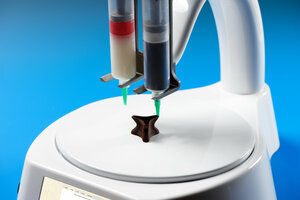Digital food processing initiative supports innovation
Personalised food, vegetable proteins with the bite of meat or production on demand; digitally controlled food production enables innovations which were inconceivable until very recently. From 29 June, businesses can address all their questions about digital technology to the Digital Food Processing Initiative (DFPI), a cooperative venture between Wageningen University & Research, TNO, AMSYSTEMS Center and Eindhoven University of Technology.
The launch of the Digital Food Processing Initiative will take place on 29 June during the 3D Food Printing Experience at the Wageningen campus. “We provide companies with insight into the possibilities and support them with knowledge about food and high-tech systems,” says Ben Langelaan, research manager Food Technology in Wageningen UR and member of the DFPI steering group. “This helps them more easily translate ideas to the market.’
The ambition of the DFPI is to be the global consortium for digitally controlled food production. “Our combined expertise of food and digital technology is unique, which is why we can really help companies move forward,” adds Pieter Debrauwer, research manager at TNO/AMSYSTEMS Center and member of the DFPI steering group. “Sometimes it may be necessary to change the recipe in order to create an attractive product, while at other times the equipment needs adapting in order to realise the right process conditions.”

More than 3D printing
DFPI focuses on five innovation themes: sustainability, personalised food, on-demand food production, new forms and flavours, and new social experiences. While the main food applications to date have been related to 3D printing – such as new shapes of pasta – both organisations expect digital techniques to have a much larger social impact.
On-demand production, for example, could lead to less food waste, while personalised food can help produce special high-protein products for the elderly or athletes. 3D printing can change the functionality of food via the development of new structures, textures and flavours, which could have potential for people who have difficulty swallowing. Digital techniques are expected to drastically change the production, location and logistics of food production.
Introduction
Food producers, ingredient suppliers, machinery manufacturers, caterers, retailers and other interested parties can have a first look on 29 June at the options for digital food processing. The introduction will include various demonstrations of 3D food printing and presentations on the successful application of digital techniques in the food industry. Professor Arthur Mol, Rector Magnificus and vice-president of the WUR Executive Board, will officially launch the DFPI at 11.30. Learn more about the programme and register at the event page for the 3D Food Printing Experience.
Initiators
DFPI is a joint initiative of Wageningen Food & Biobased Research, the Wageningen chair groups Food Process Engineering and Physics and Physical Chemistry of Foods, and AMSYSTEMS Center, a partnership between TNO Equipment for Additive Manufacturing and TU Eindhoven High Tech Systems Center.